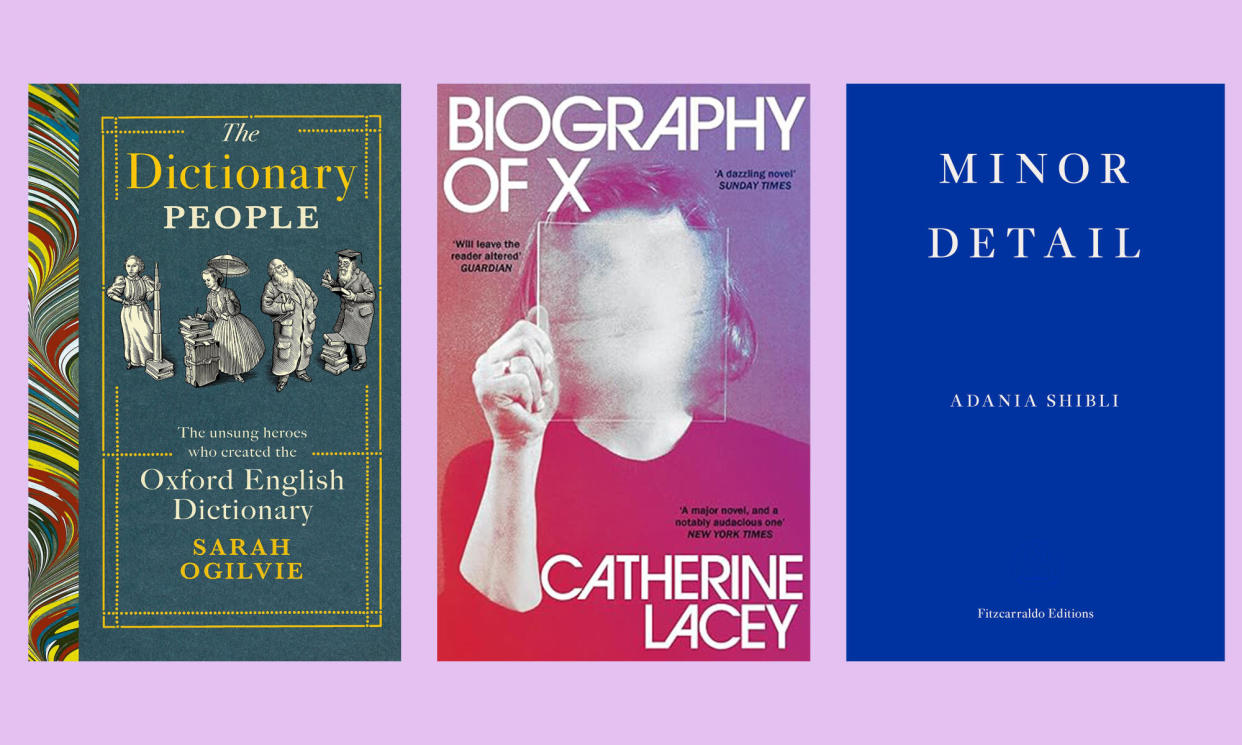What we’re reading: writers and readers on the books they enjoyed in April

Noreen Masud, author
I have been travelling a lot this month, back and forth between London and Devon and my mum’s house in Scotland. Train journeys feel like permission to read. The Quick and the Dead by Joy Williams has been on my shelf for years, but I finally finished it while on the tube two weeks ago. What a writer! Her mind is like cold, alien moonlight. She goes to the heart of the things we don’t talk about.
My recent reading has been steered by the violence in Gaza. Minor Detail by Palestinian author Adania Shibli is every bit as good as everyone says. I read it in a single train journey: just over 100 pages, and not a word wasted. Shibli asks us: what counts as a minor detail? Which events matter and which “don’t”? Whose lives matter, in short. Now I’m halfway through Namesake: Reflections on a Warrior Woman by NS Nuseibeh. I worried that this would be saccharine and predictable – I was so, so wrong. Writing about Muslim history and life in and beyond Jerusalem, British-Palestinian writer Nuseibeh consistently and courageously refuses to take the easy route out, to settle for straightforward narrative closure. I recognise a great deal in this book, and I have also learned so much from it.
On top of that, I have been reading the books that have been shortlisted alongside mine for the inaugural Women’s prize for nonfiction. So far I’ve read Code Dependent by Madhumita Murgia and How to Say Babylon by Safiya Sinclair, both of which are just breathtaking – I’d be so thrilled to see either of them win. Next up is Tiya Miles’s All That She Carried!
• A Flat Place by Noreen Masud is published by Penguin (£10.99). To support the Guardian and Observer order your copy at guardianbookshop.com. Delivery charges may apply
***
Laura Wilson, author and critic
I have just finished reading the books I got as Christmas presents, the last of which was The Dictionary People by Sarah Ogilvie. It is the story of the first complete Oxford English Dictionary, published in 1928 after more than 70 years’ work, and the hundreds of men and women who were instrumental in its creation. The disparate group contained not only academics and well-educated, intellectual women who, in more enlightened times, would have been allowed academic careers, but also three murderers, a cannibal, a prodigious collector of pornography, the inventor of the tennis-net adjuster, Eleanor Marx, daughter of Karl, and several inhabitants of what were then referred to as “lunatic asylums”. Lexicographer Ogilvie does a marvellous job of bringing them all to life, using an appropriately alphabetical format. It’s surprisingly moving: I found myself in tears at the end. I think any lover of words would enjoy this as much as I did.
I have been trying to re-read my way through the work of the two Celias, Fremlin and Dale, who are the grandmothers of British domestic noir. Mystery writer Dale deserves to be far better known than she is, and A Helping Hand, first published in 1966, is one of her finest. There are shades of both Patricia Highsmith and Muriel Spark in this subtle, scalpel-sharp, and utterly chilling study of co-dependency. The “helping hands” belong to Josh and Maisie Evans, who take vulnerable elderly ladies into their home, offering both practical and emotional care – but seeming kind is not always being so …. The horrors that lurk behind Dale’s genteel facades are a thousand times more unnerving than any serial killer gore-fest, precisely because they are so very, very close to home.
***
Related: Biography of X by Catherine Lacey review – who is this mysterious artist?
Andrew, Guardian reader
I recently read Biography of X by Catherine Lacey, which is a novel about a woman known as X, told from the perspective of her widow. It is set in an alternative US in which the southern and northern and western states separated after the second world war. X, we learn, migrated to the northern states at the end of the 60s after being involved in a terrorist group. She then took on a new identity and became a songwriter, author and artist throughout the 70s and 80s, working with David Bowie at one point. Lacey intersperses the text with photographs and artwork specifically made for the book. It was a joy to read and definitely one of the best books – along with Gabrielle Zevin’s Tomorrow, and Tomorrow, and Tomorrow – that I have read in the last couple of years. I loved the way it weaves US history and contemporary issues together.
***
Peter Hain, author and Labour peer
I recently enjoyed In at the Kill by master thriller writer Gerald Seymour, featuring crotchety MI5 anti-hero Jonas Merrick. Seymour has a knack of getting right inside his characters in plots that are drily compelling.
A quite different novel is Nicole’s War by Andrée Rushton, a fascinating under-the-radar insight on life in Nazi-occupied Paris, intriguingly drawn from the experience of the author’s late mother.
The brilliant Nelson & Winnie by Jonny Steinberg swept me along – penetrating rather than prurient, intriguing and insightful on Nelson Mandela and his indomitably defiant wife.
James O’Brien made my blood boil with his meticulously researched but readable exposé, How They Broke Britain. He clinically takes apart those culpable for Brexit, austerity and the neoliberal curse inflicted on us hapless citizens, leaving a sadly diminished society.
• The Lion Conspiracy by Peter Hain is published by Muswell Press (£14.99).


